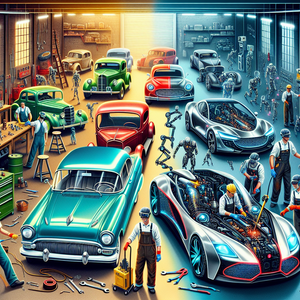Diesel Mechanics in the Age of Electric Vehicles

The advent of electric vehicles signals a fundamental change in automotive technology. EVs are not just a fleeting trend; they represent a concerted movement towards sustainability, efficiency, and innovation. For diesel mechanics, this shift necessitates an expansion of their skill sets to encompass electric drivetrains, battery systems, and advanced electronic components. Understanding the fundamental differences between diesel and electric systems is critical for staying relevant in the industry. For instance, diesel engines are primarily mechanical systems, relying on components like fuel injectors and turbochargers for propulsion. In contrast, electric vehicles operate through intricate electronic control units, regenerative braking systems, and battery management technologies. Diesel mechanics must become adept at diagnosing and repairing these advanced systems, making specialized training programs and certifications in electric vehicle technology essential.
The Skills Mechanics Need to Acquire
To thrive in an increasingly electrified automotive landscape, diesel mechanics must focus on acquiring a new set of skills. Here are several critical areas for development: 1. Electrical Systems: A solid understanding of electrical theory and systems is indispensable. Diesel mechanics must familiarize themselves with high-voltage systems, including battery technology, electric motors, and their associated components. 2. Diagnostics and Software: Electric vehicles often depend on sophisticated software for diagnostics, performance optimization, and fault detection. Mechanics must learn to navigate specialized diagnostic tools and software platforms to troubleshoot and resolve issues effectively. 3. Safety Protocols: The high-voltage systems in electric vehicles introduce unique safety concerns. Mechanics need to be well-versed in safety protocols to protect themselves and their customers during repairs and maintenance. 4. Continuing Education: Numerous manufacturers and training institutions now offer courses and certifications tailored to electric vehicle maintenance and repair. Engaging in continuous education will not only enhance skills but also position mechanics as knowledgeable professionals in a competitive job market.
Job Market and Salary Expectations
As the automotive industry pivots towards electric vehicles, the job market for diesel mechanics may experience notable shifts. While the demand for traditional diesel mechanics may decline, opportunities for electric vehicle maintenance are on the rise. According to the U.S. Bureau of Labor Statistics, employment of automotive service technicians and mechanics is projected to grow, primarily driven by the increasing prevalence of electric and hybrid vehicles. In terms of salary, diesel mechanics have historically enjoyed competitive pay, often ranging from $40,000 to $70,000 annually, depending on experience and location. However, the transition to electric vehicles may create new avenues for higher earnings. Mechanics who invest time and resources into learning about electric vehicle technology can position themselves as valuable assets in repair shops, dealerships, and fleet management companies, potentially commanding higher wages due to their specialized skill sets.
The rise of electric vehicles presents both challenges and opportunities for diesel mechanics. While the shift towards electric technology may alter the traditional role of diesel mechanics, embracing these changes and acquiring the necessary skills can help secure their place in the evolving automotive landscape.
Electric Vehicle Technician
Tesla, Rivian, and local EV service centers
Core Responsibilities
Diagnose and repair electric drivetrains, battery systems, and associated electronic components.
Perform routine maintenance and software updates on electric vehicles.
Required Skills
Proficient in high-voltage electrical systems and safety protocols.
Familiarity with specialized diagnostic tools and software for electric vehicles.
Hybrid Vehicle Systems Specialist
Ford, Toyota, and hybrid vehicle dealerships
Core Responsibilities
Conduct troubleshooting and repairs on hybrid vehicle systems, including both electric and combustion components.
Collaborate with engineering teams to improve hybrid system performance and efficiency.
Required Skills
Knowledge of internal combustion engines, as well as electric motor operation and control systems.
Certification in hybrid technology (e.g., ASE Hybrid and Electric Vehicle certification).
Electric Powertrain Engineer
General Motors, Volkswagen, and innovative automotive startups
Core Responsibilities
Design and optimize electric powertrain systems, including motors, inverters, and battery management systems.
Conduct performance testing and simulations to ensure system efficiency and reliability.
Required Skills
Strong background in electrical engineering or automotive engineering.
Experience with computer-aided design (CAD) software and simulation tools.
Automotive Diagnostic Technician
National automotive chains (like AutoZone), independent repair shops, and dealerships
Core Responsibilities
Utilize advanced diagnostic equipment to identify issues in both traditional and electric vehicle systems.
Document findings and recommend repairs based on thorough analysis.
Required Skills
Strong analytical skills and attention to detail.
Proficiency in using automotive diagnostic software and tools.
Automotive Safety Compliance Inspector
Government regulatory agencies, vehicle compliance firms, and automotive manufacturers
Core Responsibilities
Inspect electric and hybrid vehicles to ensure they meet safety standards and regulations.
Prepare reports and communicate findings to manufacturers and regulatory bodies.
Required Skills
In-depth knowledge of automotive safety standards, particularly related to electric vehicles.
Certification in vehicle safety inspection and compliance (e.g., ASE Certification).


